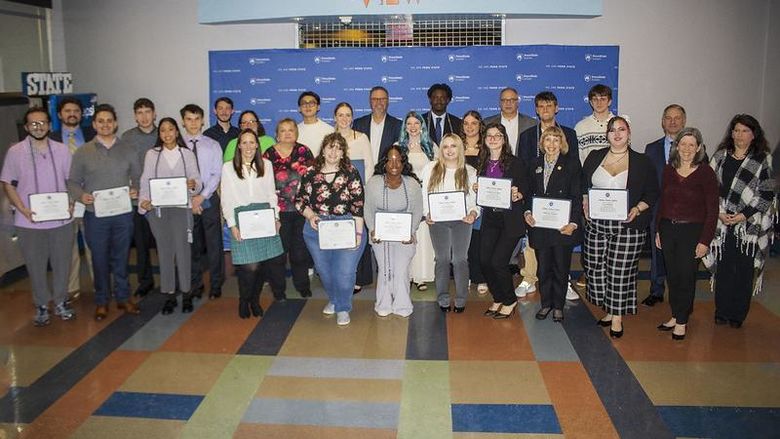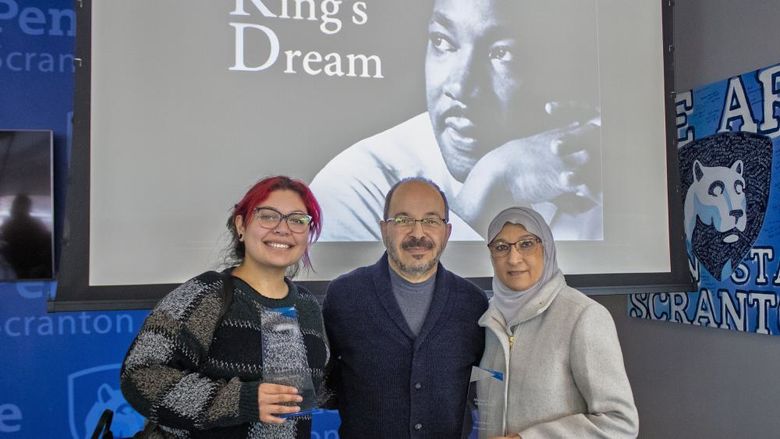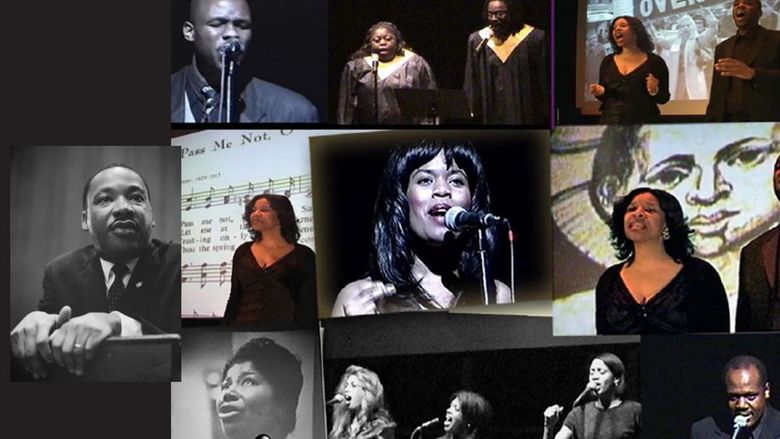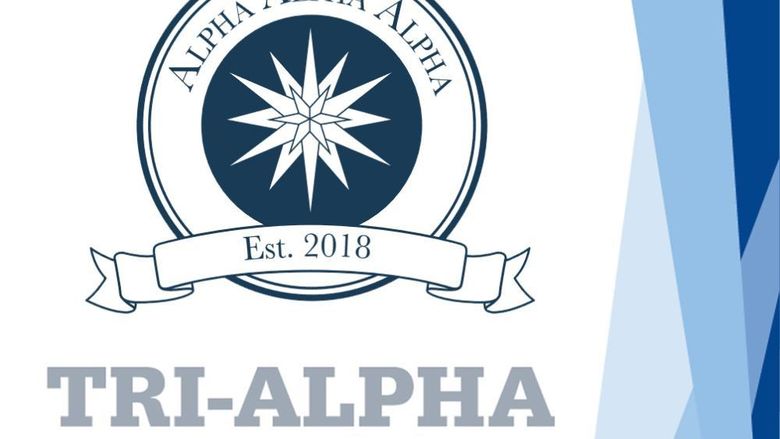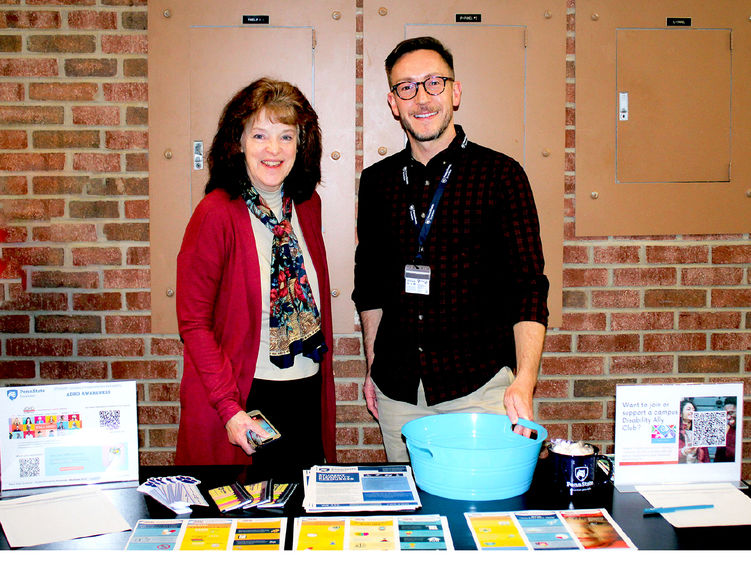
Associate Director of Learning and Disability Services Eileen Giovagnoli and Disability and Learning Services Specialist Matthew Smith held a week-long series of informational events last month to make students more aware of the services and resources available to those with disabilities, as well as promote a new disability ally club on campus that will bring together individuals both with and without disabilities to advocate for students with disabilities. They also had an informational table set up and were on hand throughout the week to speak with students one-on-one.
DUNMORE, Pa. — Students with disabilities, whether they be physical, emotional or academic, are often faced with unique challenges when attending college. And, oftentimes, their disabilities are not always obvious to their fellow students or faculty members, making it even harder for them to get the support they need in order to succeed in the higher ed environment.
Not all disabilities are obvious
Research shows that students with invisible disabilities, such as a learning disability or attention-deficit/hyperactivity disorder (ADHD), are less likely to seek services that support their academic success. So, to help reach students who may need a helping hand, Penn State Scranton’s Student Disability Resources staff held a week-long Disability Awareness effort on campus last month.
Disability and Learning Services Specialist Matthew Smith helped organize the effort and was on hand to talk to students looking for more information or assistance. There were information tables set up in the lobby of the Study Learning Center with flyers on common myths surrounding ADHD and facts to dispel them; information on how students could share their stories; and which disabilities are considered invisible. Smith was also promoting a new disability ally club on campus — a collaborative group for students with and without disabilities to come together to advocate for students with disabilities.
Since the club is still in its formative phase, it does not have an official name. However, Smith had already received over 25 signatures in support of the club’s mission during the awareness week and plans to further raise awareness through future events such as guest speakers, campus information tables, a presence at New Student Orientation (NSO) events, club fairs and Penn Stater for the Day.
“Our students are wonderfully supportive,” said Smith. “Whenever someone stops by, the conversation is always empathetic. Our students are always willing to join the conversation and share some personal experiences they or someone they know has had. I've had students ask advice on how to best interact and communicate with friends who are open about living with invisible disabilities. Their genuine search for knowledge and understanding is phenomenal.”
Smith believes that any conversation about disability is a success. “Normalizing terminology creates understanding,” he said.
"Experts estimate that 1 in 8 U.S. college students have at least one disability," according to Scott Lissner, the public policy committee chair at the Association on Higher Education and Disability (AHEAD). For more than 75% of students at Penn State who self-identify as having a disability, the disability is invisible to a viewer — such as a learning disability, attention deficit disorder, autism spectrum disorder, or a psychological disorder such as anxiety or depression.
In addition, many physical and health impairments are not visible, including some vision and hearing disabilities, physical health disorders or traumatic brain injury. Yet, research shows that only 17 percent of students who received services for disabilities in high school register for services in college due to fear of the stigma surrounding being disabled. A recent study surveyed college students who identify as having disabilities but do not self-disclose to their university and found the top reasons students do not seek services are due to not feeling comfortable disclosing information with a professor, or they did not know their college provided services.
“Because of this, we want to raise awareness about disabilities and the services we provide to hopefully lower this stigma,” said Smith. “This needs to be a collaborative effort from our campus community to support our students who identify with disabilities, so we can increase our reach for implementing services that benefit academic success and fulfill the campus commitment to the inclusion of all students. Ultimately, we hope to build empathy and understanding for all students. It is important that we, as a community, support all members of the community.”
The importance of being an ally
“When we learn about and understand our differences, we build community,” Smith explained. "Disability is a part of diversity, and every member of our community needs to feel seen and supported. We work better as a community when we are more knowledgeable and supportive of our differences.”
On campus, the Learning and Writing Center in the Hawk Student Success Center, provides an inclusive environment, providing assistance to all students in meeting their academic goals. “We meet students where they are in their Penn State academic journey to build on existing skills and knowledge,” said Associate Director of Learning and Disability Services Eileen Giovagnoli. "Students with disabilities often benefit from repeated exposure to course concepts and the opportunity to get individualized support. In a tutoring session, students can find ways to learn the material that suits their style of learning and tutors can work with students to find what approaches are best. Students also have the opportunity to ask questions and to work at their own pace.”
In a tutoring session, students also can get tips for studying for that course.
“Studying for a math class may involve different strategies than studying for biology, chemistry, or even accounting. Tutors can provide tips on subject-specific study skills. A student with a disability that impacts reading or writing may find it helpful to work with a writing tutor to enhance reading comprehension or learn how to review their writing assignments to catch common errors related to their disability,” Giovagnoli explained.
Bringing awareness to the campus community
“People with a disability are a large part of our focus, as we strive to be a welcoming, all-inclusive safe space for everyone,” said Coordinator of Diversity, Equity and Inclusion Emily Glodzik. "Making the campus community aware of the challenges people with disabilities face is crucial not only to the person affected, but it gives us a key to a greater understanding of what they face. This understanding leads to a new perspective, which can be life changing.”
Glodzik hopes these events give faculty, staff and students a unique perspective they may never have considered before and hopefully open them up to helping create a comfortable and welcoming atmosphere for those with disabilities.
“To make the campus welcoming for people with disabilities, we should never assume anything about any person,” she said. “Making no assumptions creates an environment which is open and welcome to everyone and anything they can be capable of.”
Student Disability Resources is located in the Dave and Ann Hawk Student Success Center in the lower level of the Study Learning Center. Students can go there for disability services and to request help with obtaining reasonable accommodations from faculty for achieving academic success. The role of Disability Resources is to help level the playing field for students with disabilities and provide equal access to their education. More information can be found here.
